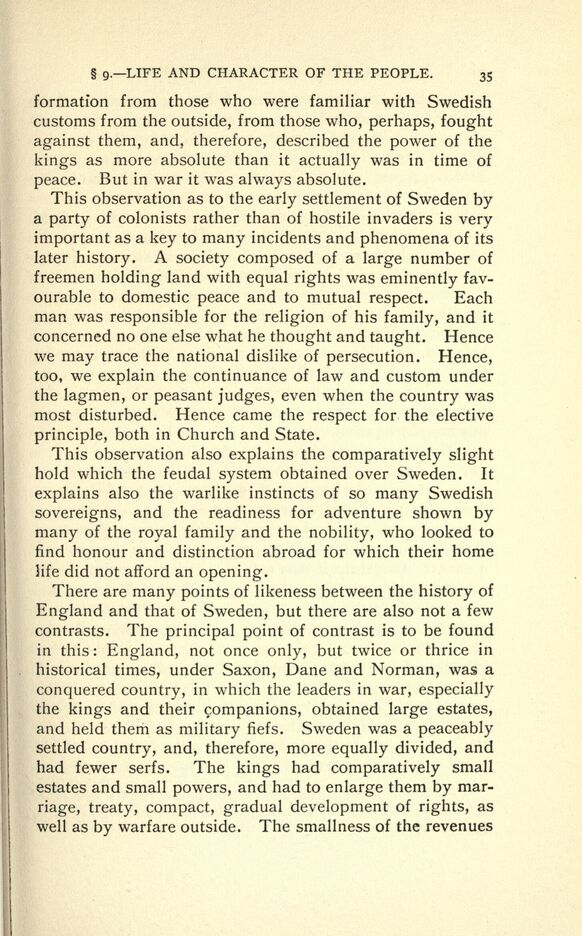
Full resolution (JPEG) - On this page / på denna sida - I. Introductory Lecture.—The Country and its Inhabitants in the Heathen Period up to 1000 A.D. - § 9. General idea of the character and life of the people

<< prev. page << föreg. sida << >> nästa sida >> next page >>
Below is the raw OCR text
from the above scanned image.
Do you see an error? Proofread the page now!
Här nedan syns maskintolkade texten från faksimilbilden ovan.
Ser du något fel? Korrekturläs sidan nu!
This page has never been proofread. / Denna sida har aldrig korrekturlästs.
g. LIFE AND CHARACTER OF THE PEOPLE. 35
formation from those who were familiar with Swedish
customs from the outside, from those who, perhaps, fought
against them, and, therefore, described the power of the
kings as more absolute than it actually was in time of
peace. But in war it was always absolute.
This observation as to the early settlement of Sweden by
a party of colonists rather than of hostile invaders is very
important as a key to many incidents and phenomena of its
later history. A society composed of a large number of
freemen holding land with equal rights was eminently fav
ourable to domestic peace and to mutual respect. Each
man was responsible for the religion of his family, and it
concerned no one else what he thought and taught. Hence
we may trace the national dislike of persecution. Hence,
too, we explain the continuance of law and custom under
the lagmen, or peasant judges, even when the country was
most disturbed. Hence came the respect for the elective
principle, both in Church and State.
This observation also explains the comparatively slight
hold which the feudal system obtained over Sweden. It
explains also the warlike instincts of so many Swedish
sovereigns, and the readiness for adventure shown by
many of the royal family and the nobility, who looked to
find honour and distinction abroad for which their home
life did not afford an opening.
There are many points of likeness between the history of
England and that of Sweden, but there are also not a few
contrasts. The principal point of contrast is to be found
in this: England, not once only, but twice or thrice in
historical times, under Saxon, Dane and Norman, was a
conquered country, in which the leaders in war, especially
the kings and their companions, obtained large estates,
and held them as military fiefs. Sweden was a peaceably
settled country, and, therefore, more equally divided, and
had fewer serfs. The kings had comparatively small
estates and small powers, and had to enlarge them by mar
riage, treaty, compact, gradual development of rights, as
well as by warfare outside. The smallness of the revenues
<< prev. page << föreg. sida << >> nästa sida >> next page >>